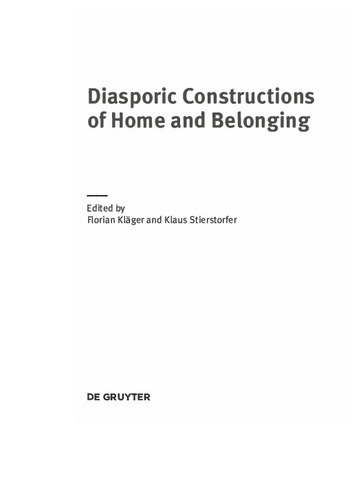Too Chinese/Too Cuban: Emotional Maps and the Quest for Happiness in Cristina García’s Monkey Hunting
Autor(es) y otros:
Palabra(s) clave:
literatura, literatura postcolonial, estudios postcoloniales, estudios de genero, literatura inglesa, literatura caribeña
Fecha de publicación:
Editorial:
De Gruyter
Citación:
Descripción física:
Resumen:
Ethnic minorities have traditionally been absent from the national imaginaries of the Caribbean. Built upon notions of mestizaje, Caribbean national identities, histories and politics tend to reproduce colonial hierarchies and discourses of inequality as they privilege certain groups as the caretakers and guides of others towards political maturity. In Cuba, the continu- ation of the dynamics of colonial power is established between creole and Afro-Cuban catego- ries, while the Chinese and other ethnic minorities are completely neglected, and thus erased from the national imaginary. As it deals with the Chinese in Cuba, Cristina García’s novel Monkey Hunting (2003) not only displays Chineseness as a category that already inhabits Cubanidad, the essence of Cuban national identity, but it also poses a challenge to reductionist definitions of these categories and spaces. The novel manages to create tension between given national and ethnic discourses while highlighting the crucial and strategic role played by emotions in proc- esses of community making and exclusion. Impositions compelled by geographical boundaries are eluded as special relevance is placed on the disclosure of affect as performance, and alter- native ways of belonging based on shared promises of happiness are championed against pre- sumed identifications of race, ethnicity and nationality. Contrasting with traditional formations, these alternatives do not spring from ideas of a shared past or a common origin but from a col- lective investment in futurity which commits to the continuity of the community.
Ethnic minorities have traditionally been absent from the national imaginaries of the Caribbean. Built upon notions of mestizaje, Caribbean national identities, histories and politics tend to reproduce colonial hierarchies and discourses of inequality as they privilege certain groups as the caretakers and guides of others towards political maturity. In Cuba, the continu- ation of the dynamics of colonial power is established between creole and Afro-Cuban catego- ries, while the Chinese and other ethnic minorities are completely neglected, and thus erased from the national imaginary. As it deals with the Chinese in Cuba, Cristina García’s novel Monkey Hunting (2003) not only displays Chineseness as a category that already inhabits Cubanidad, the essence of Cuban national identity, but it also poses a challenge to reductionist definitions of these categories and spaces. The novel manages to create tension between given national and ethnic discourses while highlighting the crucial and strategic role played by emotions in proc- esses of community making and exclusion. Impositions compelled by geographical boundaries are eluded as special relevance is placed on the disclosure of affect as performance, and alter- native ways of belonging based on shared promises of happiness are championed against pre- sumed identifications of race, ethnicity and nationality. Contrasting with traditional formations, these alternatives do not spring from ideas of a shared past or a common origin but from a col- lective investment in futurity which commits to the continuity of the community.
ISBN:
Patrocinado por:
Research for this paper was conducted within the national R&D projects Cosmopolis. La Ciudad Fluida (FFI2010 – 17296) and Multiplicity. Encuentros incorporados y conocimientos alternativos (FFI2013 – 45642-R), financed by the Spanish National R&D Programme (Ministry of Science and Innovation), whose support is gratefully acknowledged.
Colecciones
Ficheros en el ítem




